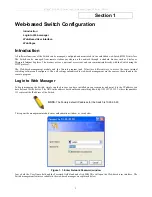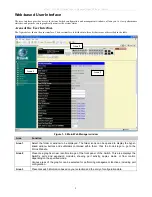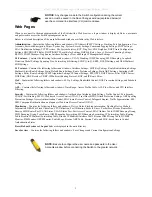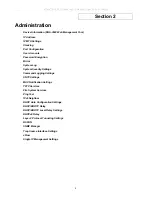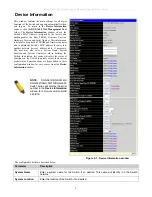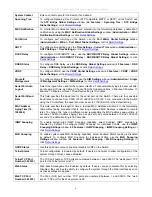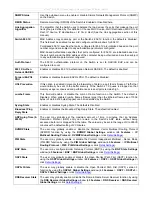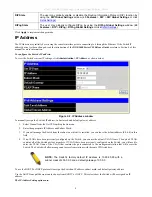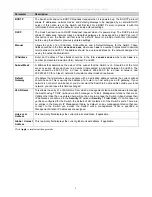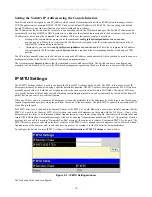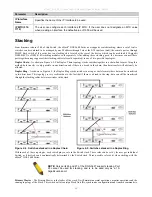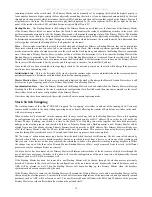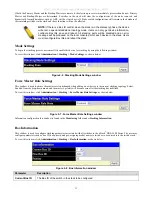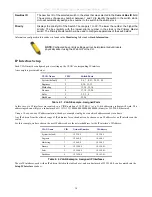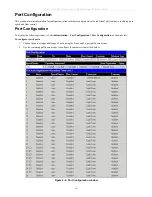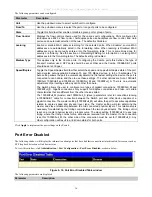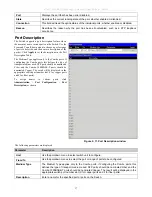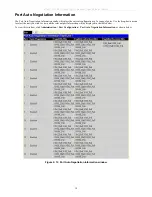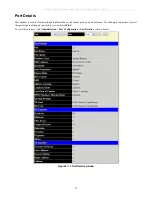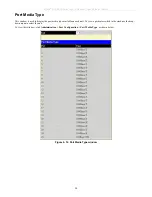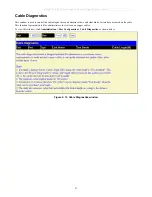
xStack
®
DGS-3600 Series Layer 3 Managed Gigabit Ethernet Switch
System Contact
Enter a contact name for the Switch, if so desired.
Spanning Tree
To configure Spanning Tree Protocol (STP compatible, MSTP, or RSTP) on the Switch, use
the
STP Bridge Global Settings
window (
L2 Features
>
Spanning Tree
>
STP Bridge
Global Settings
) or click
Detail Settings
.
MAC Notification
To monitor MAC addresses learned and entered into the forwarding database, enable MAC
notification by using the
MAC Notification Global Settings
window (
Administration
>
MAC
Notification Global Settings
) or click
Detail Settings
.
Port Mirror
To configure port mirroring on the Switch, use the
Port Mirror Global Settings
window
(
Administration
>
Mirror
>
Port Mirror Global Settings
) or click
Detail Settings
.
SNTP
To configure time settings, use the
Time Settings - Current Time
window (
Administration
>
SNTP Settings
>
Time Settings
) or click
Detail Settings
.
DHCP Relay
To configure DHCP/BOOTP relay, use the
DHCP/BOOTP Relay Global Settings
window
(
Administration
>
DHCP/BOOTP Relay
>
DHCP/BOOTP Relay Global Settings
) or click
Detail Settings
.
DNSR Status
To configure DNS Relay, use the
DNS Relay Global Settings
window (
L3 Features
>
DNS
Relay
>
DNS Relay Global Settings
) or click
Detail Settings
.
VRRP
To configure VRRP, use the
VRRP Global Settings
window (
L3 Features
>
VRRP
>
VRRP
Global Settings
) or click
Detail Settings
.
Single IP
Management
To configure Single IP Management, use the
SIM Settings
window (
Administration
>
Single
IP Management Settings
>
SIM Settings
) or click
Detail Settings
.
Serial Port Auto
Logout
Select the logout time used for the console interface. This automatically logs the user out after
an idle period of time, as defined. Choose from the following options:
2 Minutes, 5 Minutes, 10
Minutes, 15 Minutes
or
Never
. The default setting is
10 minutes
.
Serial Port Baud
Rate
This field specifies the baud rate for the serial port on the Switch. There are four possible
baud rates to choose from,
9600
,
19200
,
38400
and
115200.
For a connection to the Switch
using the CLI interface, the baud rate must be set to
115200
, which is the default setting.
MAC Address
Aging Time (10-
1000000)
This field specifies the length of time a learned MAC Address will remain in the forwarding
table without being accessed (that is, how long a learned MAC Address is allowed to remain
idle). To change this, type in a different value representing the MAC address age-out time in
seconds. The
MAC Address Aging Time can be set to any value between
10
and
1,000,000
seconds. The default setting is
300
seconds.
IGMP Snooping
To enable system-wide IGMP Snooping capability, select
Enabled
. IGMP snooping is
Disabled
by default. To configure IGMP Snooping for individual VLANs, use the
IGMP
Snooping
Settings
window (
L2 Features
>
IGMP Snooping
>
IGMP Snooping Settings
) or
click
Detail Settings
.
MLD Snooping
To enable system-wide MLD Snooping capability, select
Enabled
. MLD snooping is
Disabled
by default. To configure MLD Snooping for individual VLANs, use the
MLD Snooping
Settings
window window (
L2 Features
>
MLD Snooping
>
MLD Snooping Settings
) or
click
Detail Settings
.
GVRP Status
Use this pull-down menu to enable or disable GVRP on the Switch.
Telnet Status
Telnet configuration is
Enabled
by default. If users do not want to allow configuration of the
system through Telnet, choose
Disabled
.
Telnet TCP Port
Number (1-65535)
The TCP port number. TCP ports are numbered between
1
and
65535
. The “well-known” TCP
port for the Telnet protocol is
23
.
Web Status
Web-based management is
Enabled
by default. If users choose to disable this by selecting
Disabled
, they will lose the ability to configure the system through the Web interface as soon
as these settings are applied.
Web TCP Port
Number (1-65535)
The Web (GUI) port number. TCP ports are numbered between
1
and
65535
. The “well-
known” TCP port for the Web protocol is
80
.
6










